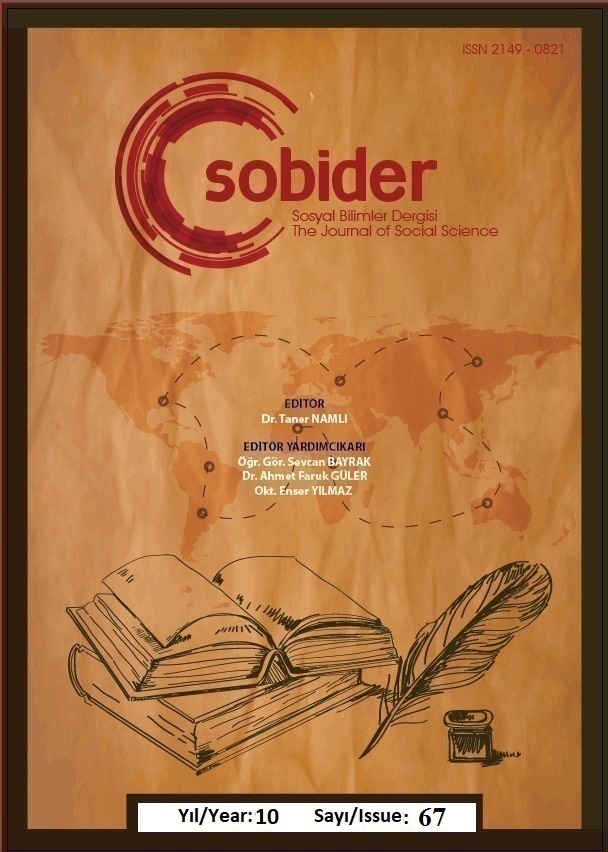Author :
Abstract
Bu çalışmada, enerji tüketimi ve küreselleşme endeksi arasındaki ilişki yenilenebilir enerji bağlamında değerlendirilecektir. Türkiye’nin 1973-2015 yıllık verileri kullanılarak Eviews11 paket programı yardımıyla analiz yapılacaktır. Bu hedef doğrultusunda, analizin başlangıç aşamasında değişkenlerin birim köklü olup olmadığını belirlemek için geleneksel birim kök testleri kullanılmıştır. Akabinde seriler arasında nedensellik ilişkisinin incelenmesi maksadıyla asimetrik (Hatemi J-Roca (2014)) ve frekans (Breitung ve Candelon (2006)) nedensellik testleri kullanılmıştır. Yapılan bu analizler sonucunda Enerji tüketiminin pozitif (enerji tüketiminin artması) ve negatif (enerji tüketiminin azalması) bileşenleri ile küreselleşme endeksinin pozitif (küreselleşmenin artması) ve negatif (küreselleşmenin azalması) bileşenleri arasında herhangi bir nedensellik ilişkisi bulunmamaktadır. Orta ve uzun dönemde enerji tüketiminden küreselleşme endeksine doğru %5 anlam seviyesinde nedensellik bulunmaktadır. Ayrıca Breitung ve Candelon (2006)) nedensellik testi sonuçlarına göre kısa ve uzun dönemde %10 anlam seviyesinde küreselleşme endeksinde enerji tüketimine doğru nedensellik ilişkisi mevcuttur. Bu da enerji tüketiminin küreselleşmeyi etkileyebileceğini ve enerji politikalarının küresel ekonomik entegrasyonu şekillendirmede önemli bir faktör olabileceğini düşündürmektedir. Sonuçlar, enerji tüketimi ile küreselleşme endeksi arasındaki ilişkinin karmaşık olduğunu ve çoklu faktörlerin bu ilişkiyi etkilediğini göstermektedir. Bu nedenle, gelecekte yapılacak çalışmalarda, diğer faktörlerin (ekonomik büyüme, dış ticaret, teknolojik gelişme vb.) de dikkate alınması gerekmektedir. Ayrıca çalışmada özellikle endüstriyelleşme ile birlikte iş modellerinde yenilenebilir enerji kaynaklarının kullanımı noktasında Türkiye’de yenilenebilir enerji alanında çalışmalar ve yenilenebilir enerji projelerine yönelik devlet teşviklerinin önemine vurgu yapılmıştır.
Keywords
Abstract
In the course of this research, the relationship between energy consumption and the globalization index will be evaluated in the context of renewable energy. Analysis will be conducted using Turkey's annual data for the years 1973-2015 with the assistance of the Eviews 11 software package. In line with this objective, traditional unit root tests were used in the initial stage of the analysis to determine whether the variables are unit-rooted. Subsequently, asymmetric (Hatemi J-Roca (2014)) and frequency (Breitung and Candelon (2006)) causality tests were employed to investigate the causal relationship between the series. As a result of these analyses, it was found that there is no causality relationship between the positive (increase in energy consumption) and negative (decrease in energy consumption) components of energy consumption and the positive (increase in globalization) and negative (decrease in globalization) components of the globalization index. However, at the 5% significance level, there is causality from energy consumption to the globalization index in the medium and long term. Additionally, according to the results of the Breitung and Candelon (2006) causality test, there is a causality relationship from globalization index to energy consumption at the 10% significance level in the short and long term. This suggests that energy consumption may influence globalization and that energy policies may be an important factor in shaping global economic integration. The results indicate that the relationship between energy consumption and the globalization index is complex and influenced by multiple factors.





